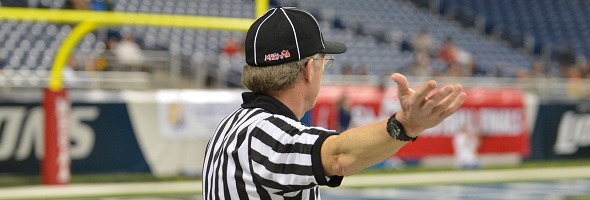
Be the Referee: Trick Plays
November 19, 2015
This week, MHSAA assistant director Mark Uyl explains which trick plays in football are allowed, and not allowed, under high school rules.
Be The Referee is a series of short messages designed to help educate people on the rules of different sports, to help them better understand the art of officiating, and to recruit officials.
Below is this week's segment - Trick Plays - Listen
In some of the biggest football games of the year, often times a trick play can be the difference between winning and losing.
Many types of these trick plays are perfectly legal – the halfback pass, the hook and ladder, or the double pass with the first pass being backward behind the line of scrimmage and the second pass going forward. There are several types of trick plays, however, that are prohibited by rule.
One is the old fumblerooski play, where a team intentionally fumbles near the center and a lineman picks up the ball and advances. A second type that is illegal is whenever you’re using substitutions or pretended substitutions to free up a receiver or player standing out along the sidelines.
Past editions:
Nov. 12: 7-Person Football Mechanics - Listen
Nov. 5: Make the Call: Personal Fouls - Listen
Oct. 29: Officials Demographics - Listen
Oct. 15: Make the Call: Intentional Grounding - Listen
Oct. 8: Playoff Selection - Listen
Oct. 1: Kick Returns - Listen
Sept. 24: Concussions - Listen
Sept. 17: Automatic First Downs - Listen
Sept. 10: Correcting a Down - Listen
Sept 3: Spearing - Listen
Aug. 27: Missed Field Goal - Listen

Be the Referee: 40-Second Play Clock
August 30, 2018
In this week's edition, assistant director Brent Rice explains how Michigan is continuing to experiment with a 40-second play clock in football.
Be The Referee is a series of short messages designed to help educate people on the rules of different sports, to help them better understand the art of officiating, and to recruit officials.
Below is this week's segment – 40-Second Play Clock - Listen
There’s an experiment taking place on a number of high school football fields across the state again this year. Michigan is experimenting with a 40-second play clock in football.
This is designed to provide more consistency from play to play as the ball must be snapped 40 seconds after the end of the previous play and is not dependent on the referee’s subjective signal.
When play is continuing without a stoppage, the 40-second play clock will be used. If play has been stopped for a time out or penalty, the play clock will be set at 25 seconds.
After two seasons, the feedback received from coaches and officials has been very positive, and there’s a possibility the Michigan experiment may become a new national playing rule soon.
Past editions
August 23: Football Rules Changes - Listen

